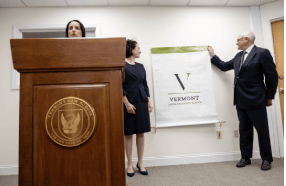Vermont Law School will add three master’s degree programs and rebrand as Vermont Law and Graduate School, school administrators announced Tuesday, adding that the changes will not impact operations at its South Royalton campus.
The law school unveiled the new name and logo at a Burlington press conference, outlining a transformation that will draw from an anonymous $8 million donation to help add two master’s programs in environmental policy and a master’s degree in animal law policy, starting in 2023.

“There’s been a period of declining enrollments in law schools over the last several years,” said Beth McCormack, the school’s interim president and dean, “but a growing interest in things like environmental law and justice reform. And so we tried to come up with a plan that would help us in that regard and build upon those strengths.”
The school has operated with a budget surplus over the past three years, McCormack said, and is not hiking tuition for the upcoming academic year.
Vermont Law School currently has about 450 residential students and 150 online-only students in both its law and master’s degree programs, according to McCormack. Administrators hope to add 100 students over the next few years.
The first students in the new courses will begin classes in the fall of 2023. School administrators said the change will involve hiring three or four new faculty members and a course designer, and expansion of the school’s footprint in Burlington.
Vermont Law School does not plan to reduce its presence in South Royalton, administrators said.
“Our main residential operations will remain in South Royalton,” McCormack said.
Two of the three new master’s programs — a master of climate and environmental policy and a master of animal protection — will be available either online or on-campus. The third new program, an executive master of environmental policy, will be completely online, with an intended focus on mid-career professionals.

Administrators said the addition of the master’s programs was intended partially as a response to an increased demand for higher education in areas of public policy related to social and environmental justice.
“These degrees enhance the rigor of our master’s programs and provide relevancy and value to today’s students,” said Jennifer Rushlow, the school’s interim graduate school dean. “And respond to the world’s most pressing needs for environmental protection, environmental and climate justice and justice reform.”




